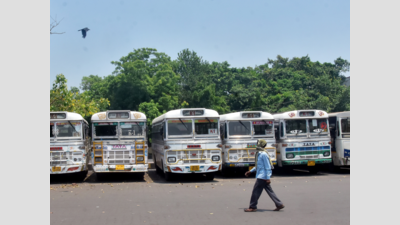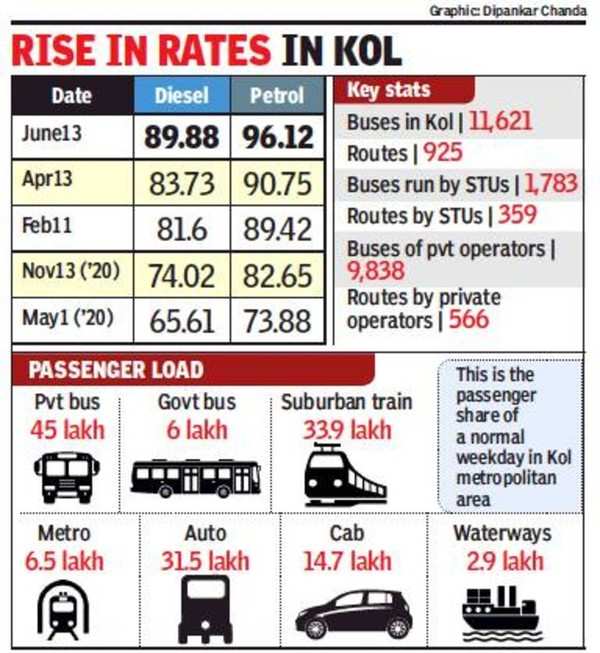- News
- City News
- kolkata News
- Costly fuel may drive private buses off Kolkata roads once curbs ease
Trending
This story is from June 14, 2021
Costly fuel may drive private buses off Kolkata roads once curbs ease
As the city is looking forward to an easing of restrictions mid-week, it might struggle with very few buses on roads because of the spiralling fuel price. Even if one-third of the workforce is allowed to attend office, a commute crisis is likely as private operators may roll out less than 5% of its fleet of 11,621 buses in the city.

West Bengal Transport Corporation (WBTC), which runs the city bus services, also faces trouble with revenue plunging to a never before level(ANI photo)
KOLKATA: As the city is looking forward to an easing of restrictions mid-week, it might struggle with very few buses on roads because of the spiralling fuel price. Even if one-third of the workforce is allowed to attend office, a commute crisis is likely as private operators may roll out less than 5% of its fleet of 11,621 buses in the city. Kolkata will be banking on buses of state transport undertakings (STUs).The diesel price in Kolkata touched an all-time high of Rs 89.88 a litre, while petrol was inching closer to Rs 100 a litre.
The private transport operators have convened a meeting on Monday and are likely to meet the state transport department officials on Wednesday. The enhanced curbs in Kolkata remain till Tuesday (June 15).

The rising fuel cost has also hit the STUs. With mounting losses, the bus operators have demanded a revision in fare immediately, otherwise they can no longer run buses incurring losses.
“There is hardly any other option, but to revise the fare. Under current fare structure, no bus can ply in the city. Ever since the last fare revision in 2018, we have struggled to remain afloat. Almost every aspect of bus operation has increased manifold. But successive revisions of fuel prices have left us crippled,” said
West Bengal Transport Corporation (WBTC), which runs the city bus services, also faces trouble with revenue plunging to a never before level. The oil marketing firms are also refusing to sell fuel on credit as the STUs have exceeded the credit limit.
“As a regular commuter, I feel bus fare should be revised rationally. Even with a slightly higher fare, a bus offers the cheapest possible transportation. If a bus goes off the road, we then end up changing two to three autos to travel the same distance, paying at least three times the bus fare,” said Tarun Das, member of United Bus Users’ Association of Kolkata.
“I bought my SUV (diesel run) in January 2019, when the diesel price was Rs 64. I spent more than Rs 1.5 lakh to buy the diesel variant so that in the long run, the fuel costs remain manageable. The gap between petrol and diesel prices was yawning. But now, the vehicle, a diesel guzzler, has become a major liability. The difference between petrol and diesel price is now less than Rs 5 a litre,” said Gaurab Basu, a paediatrician.
The private transport operators have convened a meeting on Monday and are likely to meet the state transport department officials on Wednesday. The enhanced curbs in Kolkata remain till Tuesday (June 15).

This is the passenger share of a normal weekday in Kol metropolitan area
The rising fuel cost has also hit the STUs. With mounting losses, the bus operators have demanded a revision in fare immediately, otherwise they can no longer run buses incurring losses.
In the last six months, the diesel has become costlier by Rs 15.86 a litre. Since 99% of transport vehicles (commercial vehicles like buses, cabs and trucks) run on diesel, the impact of diesel price rise is far-reaching. Apart from a substantial hike in prices of essential commodities, public transport is all set to be costlier, said Ardhendu Ghosh, a transport economist.
“There is hardly any other option, but to revise the fare. Under current fare structure, no bus can ply in the city. Ever since the last fare revision in 2018, we have struggled to remain afloat. Almost every aspect of bus operation has increased manifold. But successive revisions of fuel prices have left us crippled,” said
Tapan Bandyopadhyay, secretary of the Joint Council of Bus Syndicates.
West Bengal Transport Corporation (WBTC), which runs the city bus services, also faces trouble with revenue plunging to a never before level. The oil marketing firms are also refusing to sell fuel on credit as the STUs have exceeded the credit limit.
“As a regular commuter, I feel bus fare should be revised rationally. Even with a slightly higher fare, a bus offers the cheapest possible transportation. If a bus goes off the road, we then end up changing two to three autos to travel the same distance, paying at least three times the bus fare,” said Tarun Das, member of United Bus Users’ Association of Kolkata.
“I bought my SUV (diesel run) in January 2019, when the diesel price was Rs 64. I spent more than Rs 1.5 lakh to buy the diesel variant so that in the long run, the fuel costs remain manageable. The gap between petrol and diesel prices was yawning. But now, the vehicle, a diesel guzzler, has become a major liability. The difference between petrol and diesel price is now less than Rs 5 a litre,” said Gaurab Basu, a paediatrician.
End of Article
FOLLOW US ON SOCIAL MEDIA










